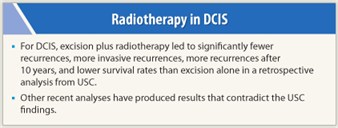For women with ductal carcinoma in situ (DCIS), radiation therapy after excision is not a slam-dunk in terms of benefits, according to a study presented at the American Society of Breast Surgeons 12th Annual Meeting.1
In a study that focused on the pattern of breast cancer recurrence in women with DCIS, many but not all women benefited from radiotherapy, reported investigators from Hoag Memorial Hospital Presbyterian in Newport Beach, California, and the University of Southern California (USC), Los Angeles. While women treated with radiation after breast-conserving surgery had a significantly lower recurrence rate, they also experienced more invasive recurrences and had cancers that recurred much later after initial diagnosis, said Janie Weng Grumley, MD, lead investigator and a fellow in breast oncology at the USC Keck School of Medicine. The study affirmed the need for long-term follow-up of patients with DCIS, she said.
Survival Rates Favored Excision Alone
“This is the first study to focus on the pattern of recurrence in patients with DCIS treated with lumpectomy,” Dr. Grumley noted. “Radiation therapy accompanying lumpectomy of DCIS is known to reduce local cancer recurrence by 50%, but when the cancer does come back, perhaps surprisingly, we found major differences in the recurrence pattern between patients who did and did not receive radiation. As more patients opt for breast-conserving therapy without radiation, a clear understanding of the differences in the pattern of recurrence will be important.”
 The study was a prospective but not randomized 10-year trial that followed 1,014 DCIS patients following breast-conserving surgery with (n = 353) or without radiation (n = 651). The study found the 10-year probability of recurrence to be 30% after excision alone and 18% after excision plus radiotherapy (P = .01). The breast cancer–specific survival rates were 99.7% and 98.3%, which, though seemingly similar, significantly favored excision alone (P = .01), Dr. Grumley reported.
The study was a prospective but not randomized 10-year trial that followed 1,014 DCIS patients following breast-conserving surgery with (n = 353) or without radiation (n = 651). The study found the 10-year probability of recurrence to be 30% after excision alone and 18% after excision plus radiotherapy (P = .01). The breast cancer–specific survival rates were 99.7% and 98.3%, which, though seemingly similar, significantly favored excision alone (P = .01), Dr. Grumley reported.
Among women whose disease recurred, local recurrences were documented in 95% of the excision-only group and 88% of the radiotherapy group (P = .08), while distant recurrences were observed in 3% and 10%, respectively, which were not significantly different (P = .08). But with excision alone, invasive recurrences were less likely (38% vs 54%; P = .0459), as were recurrences after 10 years (9% vs 33%, respectively; P < .001).
“Patients who are radiated have fewer recurrences; however, when they did recur, they were more likely to be invasive, in a different quadrant, and took longer from time of initial diagnosis to recurrence,” she noted. “And radiated patients had a slightly but significantly lower probability of survival.”
Other Recurrence Data
The average time to recurrence overall for patients not receiving radiation was approximately 4 years, compared to almost 8 years for those receiving radiation. DCIS lesions recurring in the same area of the breast were observed at a mean time of 4 years for patients not treated with radiation, but at 6 years for radiated patients.
“Overall, far fewer patients receiving radiation for DCIS have cancer recurrences. However, given current protocols for treatment and follow-up, a small subgroup of radiated DCIS patients may not be deriving maximum benefit from radiation therapy or not benefiting from it at all,” Dr. Grumley commented. “It also demonstrates that for a statistically significant number of these women, a 5-year cancer-free status is not a landmark.” ■
Financial Disclosure: Dr. Grumley reported no potential conflicts of interest.
Reference
1. Grumley JW, Lagios MD, Rayhanabad J, et al: Difference in recurrence patterns by treatment in patients with DCIS. American Society of Breast Surgeons 12th Annual Meeting. Abstract 1642. Presented April 29, 2011.

 The findings from Grumley et al contradict the results from randomized trials of lumpectomy vs lumpectomy and radiotherapy for ductal carcinoma in situ (DCIS) and highlight the potential pitfalls of retrospective analyses. The meta-analysis of the DCIS trials revealed a significant 54% reduction in ...
The findings from Grumley et al contradict the results from randomized trials of lumpectomy vs lumpectomy and radiotherapy for ductal carcinoma in situ (DCIS) and highlight the potential pitfalls of retrospective analyses. The meta-analysis of the DCIS trials revealed a significant 54% reduction in ...